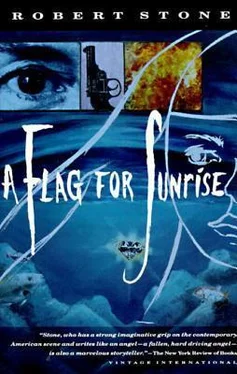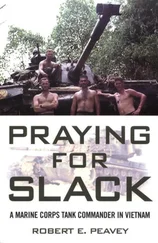Robert Stone - A Flag for Sunrise
Здесь есть возможность читать онлайн «Robert Stone - A Flag for Sunrise» весь текст электронной книги совершенно бесплатно (целиком полную версию без сокращений). В некоторых случаях можно слушать аудио, скачать через торрент в формате fb2 и присутствует краткое содержание. Год выпуска: 2012, Издательство: Vintage, Жанр: Современная проза, на английском языке. Описание произведения, (предисловие) а так же отзывы посетителей доступны на портале библиотеки ЛибКат.
- Название:A Flag for Sunrise
- Автор:
- Издательство:Vintage
- Жанр:
- Год:2012
- ISBN:нет данных
- Рейтинг книги:4 / 5. Голосов: 1
-
Избранное:Добавить в избранное
- Отзывы:
-
Ваша оценка:
- 80
- 1
- 2
- 3
- 4
- 5
A Flag for Sunrise: краткое содержание, описание и аннотация
Предлагаем к чтению аннотацию, описание, краткое содержание или предисловие (зависит от того, что написал сам автор книги «A Flag for Sunrise»). Если вы не нашли необходимую информацию о книге — напишите в комментариях, мы постараемся отыскать её.
A Flag for Sunrise — читать онлайн бесплатно полную книгу (весь текст) целиком
Ниже представлен текст книги, разбитый по страницам. Система сохранения места последней прочитанной страницы, позволяет с удобством читать онлайн бесплатно книгу «A Flag for Sunrise», без необходимости каждый раз заново искать на чём Вы остановились. Поставьте закладку, и сможете в любой момент перейти на страницу, на которой закончили чтение.
Интервал:
Закладка:
“ Buenas ,” she called to them and to Godoy.
“ Buenas ,” the boys said, and made room for her. Some of the younger boys smiled, the two oldest ogled her with grim elaborateness. She sat down next to the priest.
“We’re off,” he declared.
“Right on,” Sister Justin said gaily.
Along the roadside, plantation hands walked homeward cradling their machetes against their shoulders; children struggled along under loads of firewood for the evening meal. At every fresh creek there were women gathering up laundry from the rocks on which it had been drying in the last of the daylight, and other women were hurrying along balancing ocher jugs on their heads filled with cooking water from the public well. But most of the people on the road were walking toward Puerto Alvarado and what remained of the day’s fiesta.
Each time they passed a settlement of sticks and palm thatch Godoy would sound his horn, a child would wave and the boys in the jeep display their privilege as passengers in a private vehicle.
The road led them inland through banana and then pineapple, to the top of Pico Hill, where they could see the ocean again and the wharves of the distant port, then down again past acres of yellow-painted, numbered company houses, finally to the tin-and-crate-wood shacks on the edge of town. From the town center they could hear the report of exploding firecrackers and the blare of the sound truck the Syrian storekeeper had hired to publicize his holiday specials.
There was a block of paved street where the houses had carports and painted fences, then the Gran hotel, the Texaco station — and they turned into the crowded plaza. Godoy eased the jeep through the crowds and parked against the church wall, behind a barrier of bicycle stands. As soon as the jeep was stopped, the six Carib boys leaped out and disappeared among the crowd.
Godoy watched them go and looked at his watch.
“Now,” he told Justin with a sad smile, “the trick will be to get them back.”
The two of them went past a line of helmeted Guardia and along the edge of the church steps.
In the center of the square, a ceiba tree had been hung with paper garlands and an elderly band in black uniforms was ranged beneath its branches. There were Japanese lanterns strung between trees at two sides of the plaza and the square itself was jammed with people. Men of property stood with transistor radios pressed against their ears, teen-aged parents in cheap cotton dress-up clothes clung to their several tiny children — and lone children by the hundreds puzzled their way through the crowd’s legs. The shoeshine boys had given over their space by the fountain and sat together with their boxes at the park edge, watching for flung cigarette butts, fallen change, loose wallets.
The sailors’ girls had marched uptown from the waterfront brothels and occupied their own space on one lawn where they sat on open newspapers, singing along to the music of the nearest radio and trading comic books with each other.
Along the fountain there were teen-agers, arranged according to social class — the boys watching the prostitutes and the girls, more or less demurely, watching the boys.
There were girls in hip-huggers and “Kiss Me, Stupid” tee shirts and girls whose fancy dress was their school uniforms. There were nearly white boys who wore Italian-style print shirts and looked bored, stiff self-conscious mestizos in starchy white sport shirts, blacks who broke their Spanish phrases with “mon” and “bruddah,” practiced karate moves, swayed, danced with themselves in a flurry of loose wrists and flashing palms. Across the street, at the gate of the Municipalidad, a few Guardia leaned against the pillars and watched the crowd. They were given all the space they might require.
A little boy with an inflamed eye chased two smaller girls toward the church.
“ Mono malo, mono malo ,” he shouted after them. “Bad monkey.”
It occurred to Justin that she had been hearing children shouting “ mono malo ” at each other for weeks, and calling it also at such of the ragged wandering anglos who were still about. She had never heard an epithet like mono malo before.
In the street at the foot of the church steps, a squad of local technicians was struggling with an enormous antiaircraft searchlight, adjusting the dogs and swivels, playing out the wire that led up the steps and into the church interior. Nearby there were men and boys in the purple hoods and cassocks of the Holy Brotherhood, those who had carried the images in the afternoon’s procession.
Justin and Father Godoy stood together near the ceiba tree, facing the church. The air smelled of frangipani, of perfume and hair oil, above all of the raw cane liquor, barely rum, that was being passed in Coke bottles among the sports in the crowd.
At the stroke of darkness, the band broke into a reedy paso doble and the great searchlight sent forth an overpowering light. The light broke up the foremost ranks of the crowd, sending the people there reeling back, forcing them to turn away, hands to their eyes. Then it swept around the square, ascending until the beam was pointed straight upward, a pillar of white fire heavenward. A great gasp of joy broke from the crowd.
Spinning again, the column of light descended on the plaza, catching each second a dozen transfixed faces, dazzled the old men in their wicker chairs in the Syrian’s shop and the lounging Guardia, electrified the posters of Death Wish in front of the cinema. It made the whores’ beads sparkle, shone on the balloons and patent-leather shoes of the better-off children and on the slick flesh of the banana plants. As it whirled, the crowd screamed and applauded.
The beam came finally to rest on the steps of the church, centering on a glass-and-mahogany coffin which four men in the purple robes of the Brotherhood had carried out during the display. Prone in the coffin was the figure of Christ, which was the occasion of Puerto Alvarado’s rejoicing.
Christ wore a burial shift of waxy linen and worn lace; his hands, clutching a lily, were folded across his chest. Around his brow was a crown of thorns and his long hair was matted with blood. Both the hair and the blood had the appearance of reality and Sister Justin, who had seen the figure many times before, had always wondered about them. The eyelids were also quite authentic; one felt they might be pulled back to show dark dead eyes beneath.
A hush settled as the light fell on the dead Christ — but only for a moment. As the plaza beheld its murdered redeemer, a murmur rose from the crowd that grew louder until it drowned out the dirge of the band, swelled into moans and cries of women, hoarse Viva el Cristo’s , drunken whoops of devotion.
As he lay under the light in his glass box, he looked for all the world as though he had died the same day, in Tecan, of meningitis like the overseer’s daughter who went at Christmas, of an infected scorpion bite, of undulant fever, of a knife on the docks. So the crowd began to cheer, the children of the early dead, the parents of perished angelitos , secure in their own and their children’s resurrection — cheering the sharer and comforter of death.
Around Justin there were people on their knees. Some steps away, a woman holding a balloon in one hand and her infant daughter’s hand in the other was weeping for the deceased — out of courtesy perhaps, or habit.
Justin turned to Godoy and in the shadowy light saw a look of patient detachment on his face. When he realized that she was looking at him, he said: “See, it’s all done with light. Like the movies.”
She thought that it was something very like what she might say, although what she felt at the moment was very different. It made her wonder whether he said it only for her benefit, from embarrassment for his country.
Читать дальшеИнтервал:
Закладка:
Похожие книги на «A Flag for Sunrise»
Представляем Вашему вниманию похожие книги на «A Flag for Sunrise» списком для выбора. Мы отобрали схожую по названию и смыслу литературу в надежде предоставить читателям больше вариантов отыскать новые, интересные, ещё непрочитанные произведения.
Обсуждение, отзывы о книге «A Flag for Sunrise» и просто собственные мнения читателей. Оставьте ваши комментарии, напишите, что Вы думаете о произведении, его смысле или главных героях. Укажите что конкретно понравилось, а что нет, и почему Вы так считаете.












